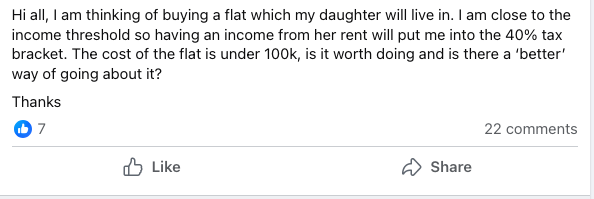
Ever scrolled through the Landlord UK Facebook group and spotted a post that hits close to home? Like this one: “I’m eyeing a flat under £100k for my daughter to live in, but the rent she’d pay me could tip me into the 40% tax bracket since I’m near the threshold. Is it worth it, and is there a better way?” Sound familiar? If you’re a parent-landlord in the North East (where affordable flats abound in spots like Peterlee or Sunderland), this dilemma mixes family support with fiscal headaches. Let’s break it down engagingly—think of it as your coffee-chat guide to dodging tax pitfalls while building wealth. We’ll weigh the worth, crunch numbers, and explore clever alternatives to keep you compliant and cash-positive.
The Issue Unpacked: Tax Traps in Family Rentals
At its core, this is about balancing generosity with HMRC realities. In 2025, UK rental income counts as taxable earnings, added to your salary or pension. If you’re hovering near the higher-rate threshold (£50,271-£125,140), even modest rent (£400-£600 pcm for a <£100k North East flat) could push you over, taxing that extra at 40% (vs. 20% basic). Plus, mortgage interest relief is capped (20% credit only), and you’d declare via self-assessment. Pros: Provides your daughter stable housing, potential capital growth (North East prices up 5% YoY per Savills), and informal “rent” builds her credit. Cons: Admin hassle, family disputes over “rent,” and voids if she moves out. Worth it outright? Maybe—if growth outpaces tax hits—but let’s see the numbers.
Is It Worth Doing? A Quick Financial Reality Check
Assume a £90k flat in Durham/Sunderland (common under £100k range, with 3% stamp duty relief for first/additional properties under £250k—£2,700 extra if second home). Mortgage at 5% on 75% LTV: ~£350 pcm payments. Daughter pays £500 pcm “rent” (market avg for 1-2 bed flats per Rightmove).
- Income Boost: £6,000/year gross rent.
- Tax Hit: If your income is £50k, this adds £6k—pushing £6k into 40% bracket (£2,400 tax vs. £1,200 at 20%). Net rent after tax/mortgage/maintenance (~£100 pcm voids/repairs in North East): £2,000-£3,000/year.
- Yields: Gross 8% (£6k / £75k equity), but net 4-5% post-tax. Capital growth: 4-6% annually (Savills forecast), adding £3,600-£5,400/year in equity.
- Break-Even: 2-3 years if growth holds; sooner if no mortgage.
Verdict: Worth it for long-term holds (5+ years) if family benefits outweigh tax (e.g., no agency fees, low voids). But if tax bump hurts cashflow, explore better paths.
Step-by-Step Solutions: Smarter Ways to Make It Work
Don’t rush the buy-to-let route—here’s how to optimize, with North East tweaks (lower conveyancing £800-£1,200, surveys £300-£500 per local averages).
- Assess Tax Mitigation First: Use your £1,000 property allowance (no tax on first £1k rent). If mortgaged, claim 20% relief on interest. Pro Tip: Track expenses religiously—repairs, insurance (£200-£300/year for flats)—to offset income. Consult an accountant (£200-£500 session) to model scenarios; apps like GoSimpleTax help for free.
- Charge ‘Informal’ Rent or None: If she’s family, consider below-market “contribution” (£200-£300 pcm) to cover costs without tipping brackets. Or no formal rent—treat as gift, avoiding income tax but losing deductions. Risks: HMRC might view as disguised income if patterned like rent.
- Buy in Her Name Instead: If she qualifies (e.g., low salary but stable job like remote worker), gift the deposit (up to £3k/year tax-free via annual exemption). She gets first-time buyer perks: No stamp duty under £425k, 5% deposit schemes (e.g., Nationwide for £4.5k on £90k). You co-sign as guarantor. Benefits: No rental tax for you; she builds equity. North East bonus: Affordable for young pros—e.g., a Sunderland flat yields independence without your tax hit.
- Use a Company Structure: For higher earners, buy via limited company (setup £100-£500). Corporation tax 19-25% on profits, full mortgage relief. But for <£100k, fees (accountancy £1k/year) might not justify unless scaling. Ideal if you own multiple—avoids 3% stamp surcharge sometimes.
- Alternatives Like Shared Ownership or Help Schemes: Start with 25-75% share (£22.5k-£67.5k for £90k), low deposit. Or use Lifetime ISA (government 25% bonus) for her down payment. If expat/parent abroad, specialist mortgages allow. Prevention: Run affordability calcs via free tools like MoneyHelper—factor rising rates (5%+).
Real-World Win: A North East dad bought a £85k Hartlepool flat in his daughter’s name with gifted deposit—she pays the mortgage, he avoids tax, and values rose 10% in 2 years. Turned potential loss into family asset!
This keeps you ahead: Focus on growth over income, and always verify with pros to stay HMRC-compliant.
Want exclusive hands-on landlord tips, fresh North East market insights, and high-yield investment opportunities delivered weekly? Join over 1,000 savvy investors in our free Property Sourcing Newsletter—no spam, just actionable value straight to your inbox. Sign up now and stay ahead in 2025!